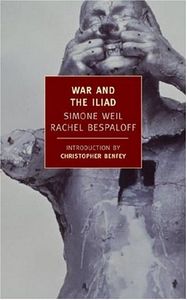Originally published as two separate essays: L'Iliade, ou, le poe`me de la force / Simone Weil ; De l'Iliade / Rachel Bespaloff. Now published together and translated into English.
Synopsis/Annotation: Simone Weil's essay on Homer is one of the uncompromising mystic moralist's most famous and powerful works - a reading of Homer which is also a nightmare vision of war as a machine in which all humanity is lost. Since it first appeared in 1939, it has served as a manifesto of pacifism. Rachel Bespaloff's recently rediscovered essay on Homer was written in the midst of World War II, partly in response to Weil. Bespaloff's account of Homer beautifully illuminates the complexities of his characters, with a focus on the existential drama of choice and a difficult awareness that at times, war is the only option. Bespaloff's essay is here presented for the first time together with Weil's, as it was originally meant to be. These two works offer a provocative demonstration of the link between great literature, philosophy, and human life and death.
Review Source: Reference & Research Book News
Review Date: August 1, 2005
ISBN: 1-59017-145-4
Weil's stunning lecture came on the eve of the Second World War, and Bespaloff's work, probably a response to Weil, was written in its midst. Although often read as pacifist manifestos, they are also brilliant pieces of literary and social criticism. Christopher Benfey (literature, Mount Holyoke) provides an introduction that sets these works in the poignant context of these women's lives, and novelist Hermann Broch provides commentary. Annotation ©2004 Book News, Inc., Portland, OR (booknews.com)
Bowker's Author Biography: Hermann Broch
Born: 1886
Died: 1951
Hometown: Vienna
Country: Austria
Occupation: Writer, Philosopher
Biography: Hermann Broch was a novelist, playwright, mathematician, and engineer. He was born in Vienna in 1886; he came to the United States in 1938. The Sleepwalkers (1932) Broch's prose trilogy describes three stages in the disintegration of modern European society. The Death of Virgil (1945), whom Broch considered a prototype of the modern individual, depicts the last eighteen hours of the life of Virgil. Broch's vision of the immanence of death will probably be regarded as his most original contribution to human experience. Broch was awarded a Guggenheim Fellowship (1941-42), a membership in the American Institute of Arts and Letters (1942), and a Rockefeller Fellowship for Philosophical and Psychological Research at Princeton (1942-44). Broch died in 1951. ( Reader's Advisor copyright 1996 )
